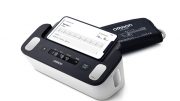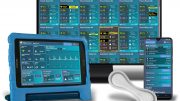The healthcare system in the UK continues to be overwhelmed by a multitude of challenges, from wait times to staff shortages. Research shows that patient satisfaction is at an all-time low and the need for an efficient healthcare system is mounting. With the onset of AI-driven technologies promising efficiencies across sectors, the healthcare industry has an opportunity to innovate and use AI to solve at least some of its issues. However, using it responsibly is critical for success.
Demand for digital technologies
Latest figures show that 7.75 million people are waiting for NHS treatment, the highest figure since records began in 2007. Unsurprisingly, this is perhaps one of the main reasons for the growing dissatisfaction with health services in the UK.
The old-time solution might have been to hire more staff and build more facilities to handle patient demand, but that solution is unsustainable. Healthcare systems can’t hire or keep healthcare workers in sufficient numbers to adequately deal with patient demand. As a result, healthcare personnel are extremely prone to burnout, with more than 1 in 5 healthcare workers taking sick days due to stress, and double the chance of patient safety problems.
That’s why digital technologies are playing a major role in helping to ease some of the pressures that the NHS and healthcare systems around the globe are facing. In positive news, the NHS is proving to be very receptive to implementing new technologies and many projects are being rolled out already. For instance, an AI system to identify high-risk patients and prioritise necessary care is now being tested in a bid to ease winter pressures.
Speech recognition as the way forward
Leaning into new technologies means that healthcare systems can significantly reduce administrative pressure and enable clinicians to work more effectively, boosting the workplace environment and enabling better patient care.
Speech recognition is a key technology that utilises AI and enables clinicians to significantly streamline the creation of clinical documentation, reducing duplication and supporting standardisation across departments. It also improves patient record accuracy and, most importantly, frees up considerable amounts of clinician time. That extra time is crucial in addressing prevalent burnout and long wait times issues.
The Frimley Health NHS Trust is already benefitting from AI-powered, speech recognition technologies. In the past, the Trust relied on transcription services and handwritten reports for document and letter creation. While this process worked, it was slow and inefficient. Paper records had to be scanned, then entered into electronic systems. Letters had to be typed up and sent out to patients and GPs. With the move to an Epic EPR, the Trust wanted to keep its staff using their voices, but it also wanted to ensure they could create documents and letters in a much more efficient, real-time way. Frimley rolled out a cloud-based speech recognition solution, which accurately translates the voices of doctors, nurses and allied health professionals into detailed clinical narratives that feed directly into a Trust’s EPR.
Atrium Health in the US is another example of a healthcare organisation deploying the latest generation of generative AI and speech recognition technologies to automate the creation of clinical documentation during patient visits. Rather than having physicians typing or dictating large amounts of information into their notes, they are now able to simply edit the documentation. 84% of healthcare staff at Atrium Health reported an improved documentation experience and 68% said it has improved their experience providing care as automating the process has allowed them to spend more time with their patients and deliver high-quality personalised care.
As speech recognition and other AI-powered solutions evolve, we will see the most advanced solutions combining conversational, ambient and generative AI to make the clinical documentation process even more efficient. These tools can automatically and securely create draft clinical notes in seconds for immediate clinical review and completion after each patient visit. They work for both in-person and remote appointments, meaning that patients get the best experience, regardless of how they access treatment.
Addressing security concerns with Responsible AI
The growing adoption of new technologies raises security concerns amid cyberattacks and data privacy issues. According to Gartner, IT security will be one of the most important software investments for healthcare organisations in the year ahead, particularly with healthcare being one of the most targeted sectors.
Security is a huge consideration for healthcare organisations looking to purchase new software of any kind and it’s critical that technology companies develop AI responsibly and work closely with healthcare providers and the broader industry to ensure that AI is used ethically and transparently.
The partnership between healthcare organisations and technology providers will be central to the healthcare transformation. By choosing partners and solutions with proven effectiveness within the sector, such as Microsoft Cloud for Healthcare, healthcare organisations can ensure responsible and effective deployment of AI and address ongoing concerns such as data security, interoperability, and ethical considerations.
By Dr Simon Wallace, Chief Clinical Information Officer, at Microsoft





